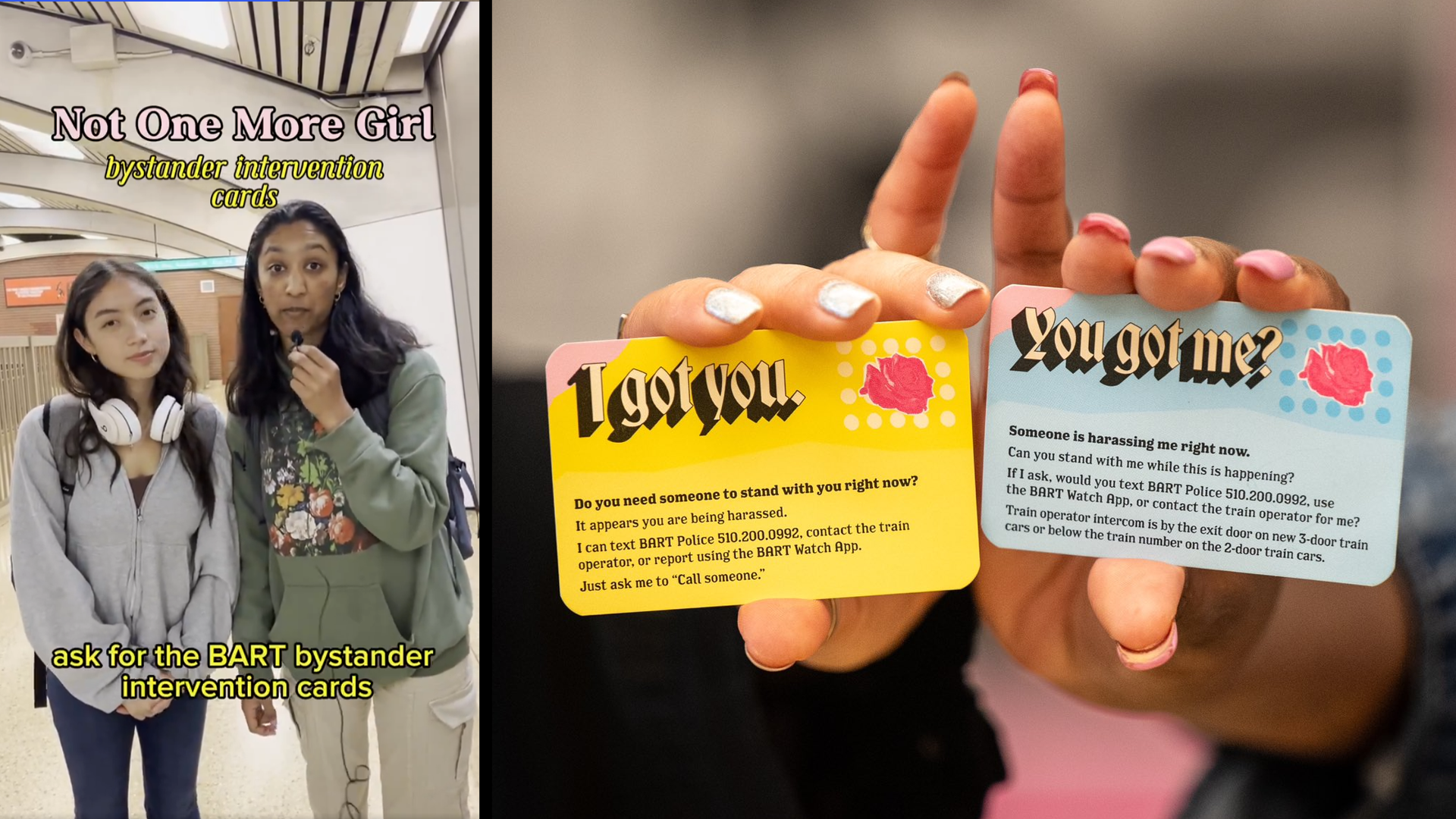San Francisco’s Bay Area Rapid Transit (BART) system is facing mockery after offering “girl-identified” passengers who are concerned for their safety “Bystander Intervention Cards.” The cute-colored cards are meant to be handed out by women facing harassment while riding the train.
Yesterday, BART uploaded a video to its official X account featuring two female college students introducing the cards as part of the “Not One More Girl” campaign, which aims to address the surge in sexual and physical violence on public transit.
In the video, the young women demonstrate the process of requesting the free safety intervention cards from transit booth workers, of which there are two different versions. One of the colorful cards reads “you got me?” and is intended to be handed out by the victim of a crime or harassment to a bystander with the intention of garnering support from that person. The other version of the card states “I got you” and is intended for bystanders to pass to victims while they are experiencing an uncomfortable situation. The cards also list off some safety tips.
The initiative has faced criticism on social media for appearing to provide no meaningful protection for female transit users, with some mocking the video and the instructions on the card.
Anna Slatz, co-founder of independent women’s news outlet Reduxx, jokingly relayed an satirical scenario in which she uses the card:
“My hands struggle to find the Bystander Intervention Card buried deep in the confines of my purse while my head is repeatedly bludgeoned by a neurodivergent racialized person of housing instability as hundreds of people watch in curiosity, unsure of if I require assistance.”
my hands struggle to find the Bystander Intervention Card buried deep in the confines of my purse while my head is repeatedly bludgeoned by a neurodivergent racialized person of housing instability as hundreds of people watch in curiosity, unsure of if I require assistance https://t.co/lSsRw2gyAx
— pagliacci the hated 🌝 (@Slatzism) March 31, 2024
California lawyer and Californians for Good Governance member Laura Powell recounted an incident in which she experienced harassment and assault while waiting in a BART station.
“I guess if I had one of these cards, someone would have stopped him!” Powell wrote sarcastically. “Safety as a card game!”
A few years ago, I was in a busy BART station in SF waiting for a train when a guy walked up to me and started shouting obscenities in my face and then spit on me. I guess if I had one of these cards, someone would have stopped him. Safety as a card game! https://t.co/FSEOTKmvcz
— Laura Powell (@LauraPowellEsq) April 1, 2024
The Bystander Intervention Card and the Not One More Girl campaign is the result of a partnership between BART, the Betti Ono Foundation, and the Unity Council’s Latina Mentorship and Achievement Program. These organizations collaborated to engage local high school and college students, gathering insights about transit experiences and soliciting ideas for action-based strategies to enhance safety and support individuals facing harassment on public transit.
The safety initiative, developed with young women and girls ages 9 and up, looked to initiate different strategies to deal with the uptick in safety concerns on public transit in recent years. In its definition of “girls and women,” BART emphasized “inclusivity” and noted its commitment to “cis girls, trans girls, non-binary youth, gender nonconforming youth, gender queer youth, and any girl-identified youth.”
Despite experiencing rapidly decreasing ridership due to the public’s concerns about a lack of safety, BART has only recently increased police presence at its transit stations. It is currently offering a $15,000 hiring bonus to fill security position vacancies.
The is not the first time BART has come under fire for appearing to put political correctness before the safety of its riders.
In 2017, BART announced it would begin withholding surveillance footage of crimes committed in its stations in order to tackle racist stereotyping.
At the time, Debora Allen, who is a member of the BART Board of Directors, said she was told that the justification for the decision was that releasing the footage would result in a “high level of racially insensitive commentary toward the district” and a “racial bias in the riders against minorities on the trains.”
Allen also released communications she exchanged with BART General Manager Kerry Hamill, who said: “If [BART] were to regularly feed the news media video of crimes on our system that involve minority suspects, particularly when they are minors, we would certainly face questions as to why we were sensationalizing relatively minor crimes and perpetuating false stereotypes in the process.”







